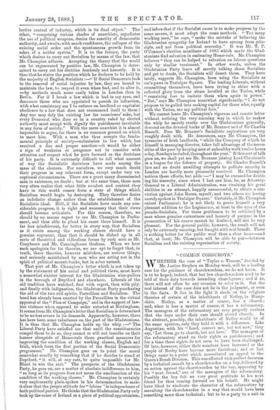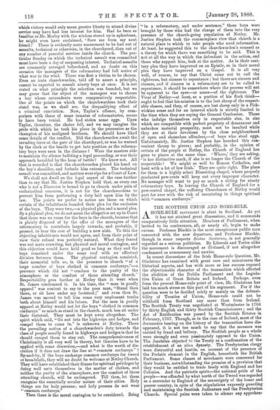"COMMON CORDUROYS."
WHETHER the case of "Taylor v. Timson," decided by Mr. Justice Stephen on Monday week, will be a leading case for the guidance of churchwardens, we do not know. It
is to be hoped, indeed, that but few churchwardens need to be told of their duty towards intending churchgoers ; and if se, there will not often be any occasion to refer to it. But the- real interest of the case does not lie in the judgment, or even in the facts. It lies in the light it sheds on the religious
theories of certain of the inhabitants of Netley, in Hamp- shire. Netley, as a matter of course, has a church ; and, what is less a matter of course, it has a reformatory. The managers of the reformatory are very properly anxious that the boys under their care should attend church. In the abstract, possibly, the inhabitants of Netley would be of the same opinion, only they hold it with a difference. Like Augustine, with his "Lord, convert me, but not now," they say, 'Let them go to church, but not here.' The managers of the reformatory stand on their rights as parishioners ; and for a time these rights do not seem to have been challenged. Of late, however, either their numbers have increased or the people of Netley have become more fastidious ; and at last things came to a point which necessitated an appeal to the Queen's Bench Division. This was effected with perfect decorum by a technical assault by a churchwarden on a boy, followed by an action against the churchwarden by the boy, appearing by his "next friend," one of the managers of the reformatory. Possibly the boy felt no very great gratitude to his next friend for thus coming forward on his behalf. He might have liked to vindicate the character of the reformatory by assaulting the churchwarden in a way that would have been something more than technical ; but to be a party to a suit in
which victory would only mean greater liberty to attend divine service may have had less interest for him. Had he been as familiar as Mr. Morley with the wisdom stored up in aphorisms, he might even have exclaimed, Save me from my next friend!' There is evidently more amusement to be had out of assaults, technical or otherwise, in the churchyard, than out of any number of peaceful services inside the church. The par- ticular Sunday on which the technical assault was committed must have been a day of surpassing interest. Technical assaults are commonly arranged beforehand, and no doubt on this occasion the managers of the reformatory had full notice of what was in the wind. There was first a victim to be chosen. Even an irate churchwarden, told off to assert a principle, cannot be expected to assault ninety boys at once. It is not stated on what principle the selection was founded, but we may guess that the object of the managers was to choose a boy whose antecedents were comparatively respectable. One of the points on which the churchwardens took their stand was, as we shall see, the disqualifying effect of a criminal conviction. Now, Taylor offence, by com- parison with those of some inmates of reformatories, seems to have been venial. He had stolen some eggs. Upon Taylor, therefore, the choice fell, and we may imagine the pride with which he took his place in the procession as the champion of his maligned brethren. We should have liked some details of the conflict. Did the churchwarden await the invading force at the gate of the churchyard, or was he warned by the clerk or the beadle to get into position as the reforma- tory boys were seen in the distance ? Were the masters able to maintain the silence befitting a legal proceeding, or was their approach heralded by the hum of battle ? We know not. All that is recorded is that the churchwarden placed his hand on the boy's shoulder, and forbade him entrance. The technical assault was committed, and matters were ripe for a Court of Law.
We shall not dwell on the legal aspect of the case further than to say that Mr. Justice Stephen held that, as every one who is not a Dissenter is bound to go to church under pain of ecclesiastical censures, it is not for the churchwardens to prevent him from performing a duty laid upon him by the law. The points we prefer to notice are those on which certain of the inhabitants founded their plea for the exclusion of the boys. They were two,—a physical plea and a moral plea. By a physical plea, we do not mean the allegation set up in Court that there was no room for the boys in the church, because that is plainly disposed of by the offer of the managers of the reformatory to contribute largely towards, and probably, if pressed, to bear the cost of building a new aisle. To this the objecting inhabitants would not agree, and from their point of view their refusal was perfectly natural. What they feared was not mere crowding, but physical and moral contagion, and this objection would have held good so long as they and the boys remained under the same roof with no effectual division between them. The physical contagion consisted, their memorial tells us, in the presence in church "of a large number of boys clothed in common corduroys,"—a presence which did not "conduce to the purity of the atmosphere or the comfort of those attending church." Respectability goes further at Netley than it went when St. James condemned it. In his time, the "man in goodly apparel" was content to say to the poor man, "Stand thou there, or sit here under my footstool ;" and even then St. James was moved to tell him some very unpleasant truths both about himself and his future. But the men in goodly apparel at Netley would not let the boys "clothed in common corduroys" so much as stand in the church, much less sit under their footstool. They must be kept away altogether. The spirit which said, "Go out into the highways and hedges, and compel them to come in," is unknown at Netley. There the prevailing notion of a churchwarden's duty towards the class of people usually found in highways and hedges is that he should compel them to stay out. The comprehensiveness of Christianity is all very well in theory., but theories have to be applied with some discretion,—and what is the worth of dis- cretion if it does not draw the line at "common corduroys " ? By-and-by, if the boys exchange common corduroys for tweed or broadcloth, they will no doubt be welcome at Netley Church. They will have established their fitness for spiritual privileges by doing well unto themselves in the matter of clothes, and neither the parity of the atmosphere, nor the comfort of those attending church, will be endangered. Till then, let them recognise the essentially secular nature of their attire. Holy things are for holy persons ; and holy persons do not wear "common corduroys." Then there is the moral contagion to be considered. Being "in a reformatory, and under sentence," these boys were brought by those who had the charge of them into the very presence of the church-going population of Netley. Mr. Justice Stephen took the commonplace view that church is a natural place to which to take people who need reformation. At least, he suggested this to the churchwarden's counsel as a theory for which there was something to be said. This is not at all the way in which the defendant in the action, and those who support him, look at the matter. As in their sani- tary plea they have improved on an Epistle, so in their moral plea they have improved on a Gospel. It is all very well, of course, to say that Christ came not to call the righteous, but sinners to repentance ; but there are sinners and sinners, and if sinners in a reformatory are to be called to repentance, it should be somewhere where the process will not be apparent to the eyes—or noses—of the righteous. The Vicar of Netley—at least, so a portion of his flock think— ought to feel that his mission is to the lost sheep of the respect- able classes, and they, of course, are lost sheep only in a Pick- wickian sense and for an interval which is strictly limited to the time when they are saying the General Confession. Those who indulge themselves only in respectable sins, in sins which are compatible with perfect propriety of demeanour and unbroken material prosperity, must not be insulted while they are at their devotions by the close neighbourhood of open and shameless offenders,—of boys who steal eggs. Unfortunately, Mr. Justice Stephen has knocked this con- venient theory to pieces ; and probably, in the opinion of certain of the people at Netley, the Church of England has gone to pieces at the same time. 'Where,' they are asking, is her distinctive mark, if she is no longer the Church of the respectable ? We might as well be Roman Catholics, and herd with a lot of low Irish.' They are quite right. The place for them is a highly select Dissenting chapel, where properly graduated pew-rents will keep out every improper character. No manager will want to pay so much a sitting for ninety reformatory boys. In leaving the Church of England for a pew-rented chapel, the suffering Churchmen of Netley would part for ever with the risk of associating in things spiritual with "common corduroys."



















































 Previous page
Previous page